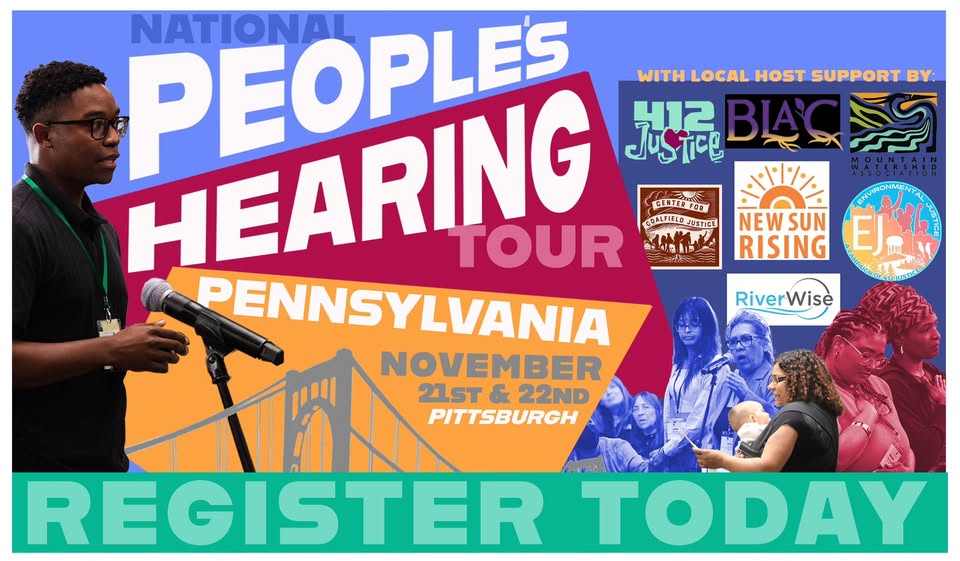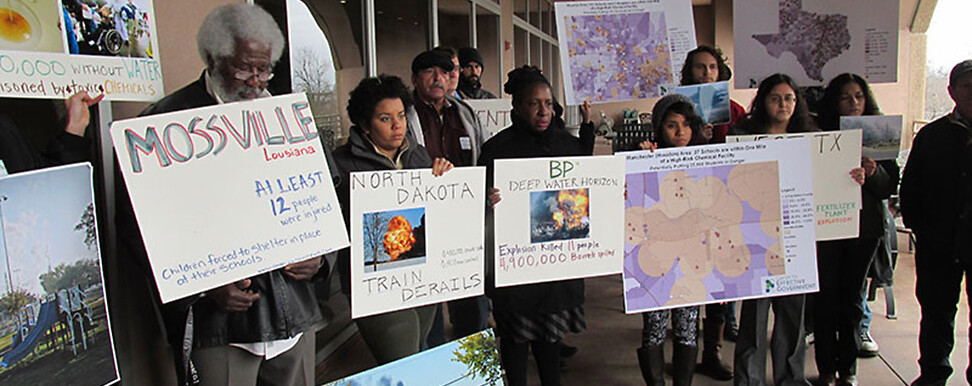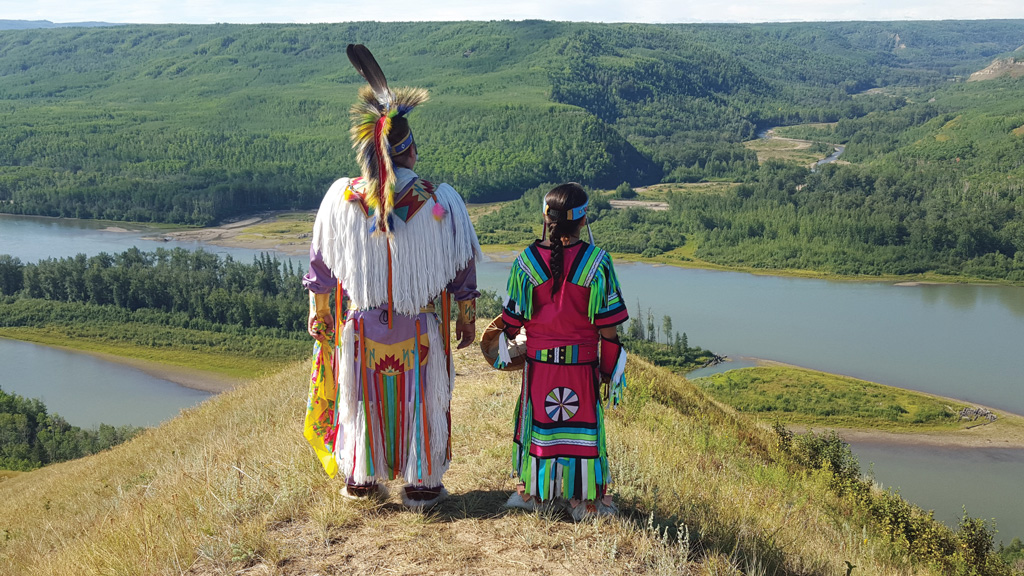Community advocates from across Pennsylvania, the United States, Tribal Nations, and US territories gathered in Pittsburgh, Pennsylvania, for the third stop on the Speak Easy, Speak Free National People’s Hearing Tour. The tour, promoted as Pennsylvania Live 2025, was a two-day public gathering centered on testimonies, community-driven solutions, and cultural celebration.
A coalition of local and Appalachian-regional organizations co-hosted the event alongside the People’s Environmental Justice Advisory Council (PEJAC). PEJAC is a collective of recognized Environmental Justice advocates, researchers, and scholars who once served on the White House Environmental Justice Advisory Council (WHEJAC) during the Biden-Harris Administration.
The Mayor of Pittsburgh, Ed Gainey, offered welcoming remarks, stating:
“The reality is you make the difference. It’s not the policy-setters in DC that’s going to make a difference, for they’ll pollute as they do. In order to get a new voice and a new policy, this is why things like this are important. A hearing tour so they can hear from the people that’s on the ground everyday.”
Mayor Gainey was joined by other Pennsylvania elected officials, including U.S. Congressional Representative Summer Lee (PA-12), Allegheny County Council District 8 Representative, Michelle Naccarati-Chapkis, and Philadelphia City Council At-Large Member, Kendra Brooks. Naccarati-Chapkis addressed the crowd, stating,
“I feel the need to encourage you that there are elected officials who are willing to show up and hear what you have to say.”
An Instagram post from Black Appalachian Coalition reflects on the two-day Speak Easy, Speak Free Pennsylvania Live National People’s Hearing
Pittsburgh: A Legacy of Connecting Culture Beyond Industry
The tour highlighted the rich history and diverse cultures of Allegheny County. Attendees were invited into the space by the beating of drums and joyful African dancers. Chief Pomaj-Chakmam-Yajalaji, chief of medicine, land stewardship, and management of the Iroquois Confederacy of Aboriginal American People, and a member of the Allegheny County Climate Action Committee, offered a land blessing and acknowledgement.
Chef Pomaj spoke of Pittsburgh’s legacy as a hub where Indigenous peoples met to trade goods along the waterways, stating:
“Please recognize this land was not ‘Frontier’. It was not just wilderness. It is, and remains, ancestral territory…”
Several Tribal Nations and Peoples, including Erielhonan (Erie), Haudenosaunee (Iroquois), Lenni Lenape, Shawnee, Susquehannock, and Tuscarora nations, and the Honniasont, Saluda, Saponi, Tutelo, and Wenrohronon tribes, continue to live and build community in their ancestral homelands, which are now known as Pennsylvania.
Industry Changes Communities
Pittsburgh is known as the City of Bridges for its scenic yellow bridges spanning the city’s intersecting riverways. In the 1800s, coal and steel became the region’s leading industries, supporting several wars and the Industrial Revolution.
The riverways also played a role in making the Pittsburgh region a key area in pre-Civil War abolitionist movements. Several churches, homes, and businesses acted as stops on the Underground Railroad, helping Black people escape slavery and find freedom in the North.
Art Imitates Life

Pittsburgh has a vibrant arts and cultural scene that draws inspiration from the region’s rich history and scenery. It is home to several famous artists, including musicians Wiz Khalifa and Mac Miller and playwright August Wilson.
Wilson’s Award-winning plays, including Fences, are set in Pittsburgh’s predominantly African-American Hill District and highlight the hardships, culture, and realities for Black people living in the industrial, working-class town.
Local Pittsburgh residents testified about the continued harms of industrial pollutants, aging infrastructure, housing discrimination, and gentrification. Brittany Smalls, Lead Regional Organizer with Black Voters Matter Fund, testified to her challenges as a mother and new resident to Pittsburgh stating,
“Affordable Housing is an Environmental Justice Issue”
Smalls noted that she faced a strenuous housing application process that included filling out race and ethnicity forms and paying multiple application fees, only to be denied.
Angel Gober, Executive Director of 412 Justice, also testified on the impact of intersectional harms. 412 Justice is a multiracial, intergenerational, and multi-issue organization focused on economic, environmental, and educational justice. Gober raised the need to end the privatization of schools, healthcare, utilities, and public spaces.
Recognizing the Victories
Saving Our Schools
While helping coordinate the People’s Hearing, 412 Justice was simultaneously leading a citywide campaign to stop the Pittsburgh Public School District from implementing a plan to close nine schools. The plan would also change the school curriculum and displace an estimated 6,000 students to schools outside their neighborhoods. On Tuesday, November 25, in response to resounding student and community opposition, the School Board voted against the plan and agreed to keep the schools open.
Instagram Post from 412 Justice celebrating the Pittsburgh Public School District’s vote to keep schools open.
Making Polluters Pay
NaTisha Washington, Campaign Director with Black Appalachian Coalition (BLAC), also spoke of important community-led victories, including a 45% increase in the Allegheny County polluter permit fee. Washington reflected on the almost two-year long coalition-based campaign, stating:
“We pushed our voices to the forefront because we knew that if we didn’t do it, we would be buried under the lies of our industries.”
Restoring Watersheds
Community residents coming from more rural parts of the region found solidarity and connection with the stories of Pittsburgh residents. Ashley Funk, Executive Director of the Mountain Watershed Association, spoke about the organization’s efforts to improve waterways across Southwestern Pennsylvania. She noted that the organization has already restored over 33 miles of stream from damage caused by coal mining.
“We are in an area with abundant natural springs for people to drink and rely on..But once a coal company comes through, it is no longer.”
Funk highlighted that the coal extracted from Southwestern Pennsylvania is then sent to the U.S. Steel coke plant in Clairton, PA, for processing. The Clairton plant has a long history of air, workplace, and environmental violations. On August 11, 2025, a fatal explosion at the plant led to two deaths, multiple injuries, and the release of toxic chemical fumes into the surrounding areas.
Advancing Beyond Political and Economic Constraints
During the first week in office, the Trump Administration rescinded landmark executive orders on Environmental and Climate Justice, closed federal environmental justice offices, and terminated grants to community programming. Several speakers discussed the impact of the rapid, extensive federal policy cuts and changes.
Bria Crawford, a former staff member in the now-dismantled Environmental Protection Agency Office of Environmental Justice, testified to racial tensions and vandalism of her office space shortly after the transition to the Trump-Vance Administration. “I just want to say I’m proud of you all for being able to still host these hearings and continuing to fight for the community.” Crawford discussed the struggle to find work, losing healthcare, and finding resilience in her hometown of Jersey City, New Jersey, adding,
“To me, Environmental Justice is not just a word; it’s boots on the ground organizing, and you motivate me so much.“

In response to cuts from the Trump Administration, the PEJAC has partnered with local community organizations across the country to host public hearings where community advocates bear witness, offer public testimony, and build solidarity.

Connecting Communities Across the Country and the World
Several participants at the hearing traveled from across North America to raise awareness of their communities’ journeys for justice. Stuart Chavez, who participated in the Arizona Live People’s Hearing, traveled with other members of the Havasupai Tribe to attend the event in Pittsburgh. Chavez noted, “We do this work for the next generation, not being selfish. We want our people to enjoy the resources that we were able to enjoy. Life that exists for all, everyone.”

Protecting The Sacred Lands of The Grand Canyon
For over a thousand years, the Havasupai People have lived in and protected a remote region near the Grand Canyon in Arizona. The Tribal Government has been fighting to close the Pinyon Plain Uranium mine that has destroyed the aquifer and contaminated the community’s groundwater. Chavez called for a change in the 1872 U.S. Mining Law, which allows foreign companies to own and operate mines in the United States, stating,
“Energy Fuels, which operates Pinyon Mine, is a Canadian company, not American. But they’re given authorization to destroy land in the US.”
A Family Fight Against Fracking
Chavez’s statement resonated with community residents living near mountaintop removal and natural gas fracking sites. Janet and Randy Denman, members of the Center for Coalfield Justice and residents of Washington County, Pennsylvania, testified to their experience living in an epicenter of the expanding natural gas industry. 14 gas wells and pump stations now surround their home. Janet Denman testified,
“We can hear them fracking all night long, we have things falling off our walls. At one point, we thought there was a ghost in our house.”
Data centers are Popping Up Everywhere
In October, Washington County-based Natural Gas company CNX announced plans to develop a data center in the county, just 20 miles south of Pittsburgh. Several other participants testified to plans for data centers in their communities.
Rania Masri, Executive Director of North Carolina Environmental Justice Network (NCEJN) reflected on the two days of testimony, stating:
“What these hearings show is that we’re not alone…I thought about data centers that are coming to North Carolina, full force. Coming to communities that are already deprived of clean water and clean air. Already deprived of economic services.”
NCEJN was one of the host organizations for the North Carolina People’s Hearing. Masri emphasized the importance of continuing to share our stories and build strategies to protect communities from environmental harm, as well as from illegal detentions, deportations, and criminalization. Masri mentioned a quote from a previous testifier who said:
“We want communities where people can live and families can stay together”
A Call for Reparations
Fawn Walker Montgomery, CEO/Co-Founder of Take Action Advocacy Group, a community organization based in the small, historic steel town of McKeesport, Pennsylvania, reflected on the many health and social justice battles stemming from pollution caused by the steel mills. Montgomery noted the historic similarities of harm across marginalized communities, stating:
“I feel like one of the biggest issues we face is systemic racism, which manifests into racist policies, unsafe living conditions, and extreme weather events.”
Walker cited the Black Climate Mandate, created by the Black Hive of Movement for Black Lives, as a guide for developing policies that advance the critical needs of local communities and the global African Diaspora.
Reflections from Previous Hearings
The first People’s Hearing was held in Greensboro, North Carolina, in June of 2025 and gathered over 450 people. Kaniela Ing, Executive Director of The Green New Deal Network and co-founder of Our Hawai’i traveled to the North Carolina hearing and testified about the impacts of corporate pollution on his homeland. Ing greeted the gathering, stating:
“I’m from Hawai’i, here in North Carolina, 4,700 miles away. Completely different culture, different shorelines, but I’m listening to you all, and it sounds like home.”
Ing then named numerous companies and industries that have polluted communities in both States and called for continued collective action and solidarity.
A short video of Ing’s testimony at the hearing went viral on social media, garnering over 13 million views, thousands of comments, and shares across Instagram and TikTok. Ing reflected on the viral video with the Nation Magazine, stating,
“I was shocked, because it was rather simple testimony from ‘the People’s Hearing’ in North Carolina. In it, I talked about pollution, corporate greed, and a united working class…Most surprisingly, it wasn’t just progressives sharing it. Its most enthusiastic audience included white working-class men in Appalachia, Native aunties in the Southwest, Filipino union workers in the Midwest, and mothers who once backed Obama, then Bernie, then RFK, then Trump. Some Christian GOP voters said the speech moved them to tears—despite its unmistakenly progressive solutions.”
From North Carolina to Arizona with Care
In September, the PEJAC joined dozens of organizations from across Arizona for a two-day hearing that convened impacted residents from across the Southwestern United States and Tribal Nations. Arizona NPR affiliate KJZZ 91.5 spoke with Yolanda Herrera, a fifth-generation Tucsonan who testified at the hearing and discussed the water crisis in her community.
“People say water is life. I’ve changed that to say, safe, clean water is life,” Herrera said. “Because you can have water and drink it and continue to get sick, and it affects generations.”
KJZZ noted that Herrera grew up on the Southside of Tucson near a host of military sites that have historically dumped cancer-causing chemicals, contaminating the community’s groundwater supply. The Mayor and City Council of Tucson are currently reviewing a resolution to recognize the victims of the contamination and provide funding and support for community members dealing with ongoing related health issues.
The Road Ahead
The diverse cadre of participants at Pennsylvania Live resonated with the importance of working together and building solidarity for genuine change. Sister Kari Pohl of the Sisters of St. Joseph of Baden, Pennsylvania, testified to the importance of the gathering, saying,
“Look around this room at each other. Look across the room. Rebecca Solnit would call this a paradise built in hell. Martin Luther King would call this building God’s beloved community. Pope Leo the 14th would call this social poetry. And I’m calling it a glimpse of the divine.“
PEJAC Member and Executive Director of Deep South Center for Environmental Justice, Dr. Beverely Wright, reflected on the two days of powerful testimony, reminding participants,
“Never let anybody tell you that you don’t exist or your reality is not reality.”
PEJAC plans to work with Agency, Communities First, and the Tishman Center for Environment and Design to host future tour stops in other parts of the country. The Tishman Center for Environment and Design will work with partners to transcribe, analyze, and archive the testimonies for future policy development and community use.
You can watch the recordings of the National People’s Hearings Tour below or on the ChecktheWeather Youtube Page




